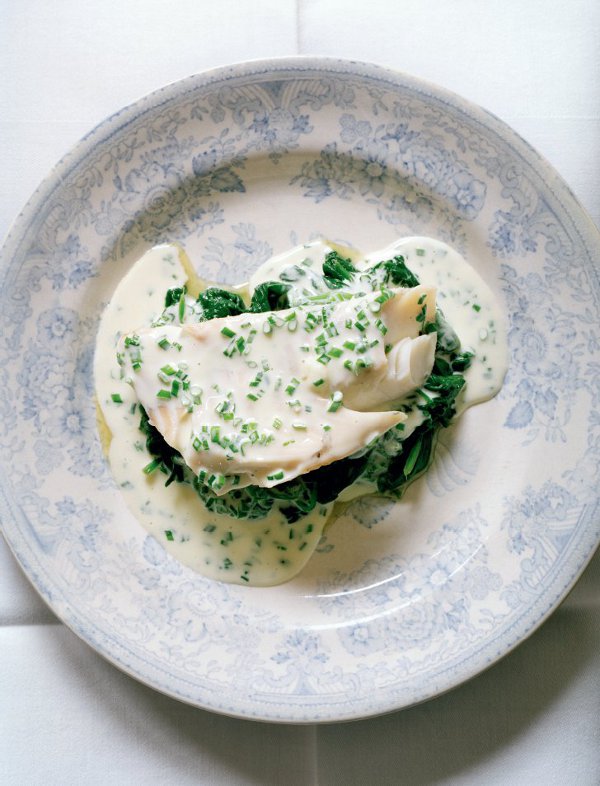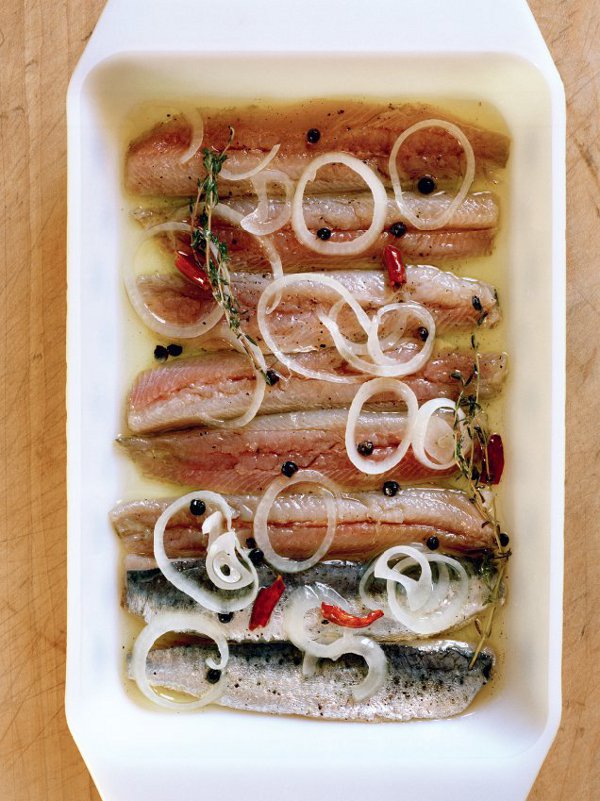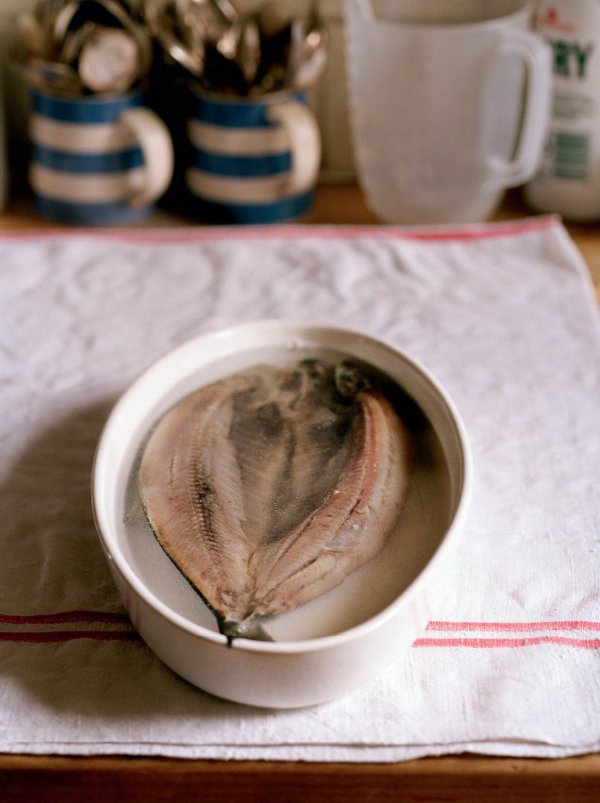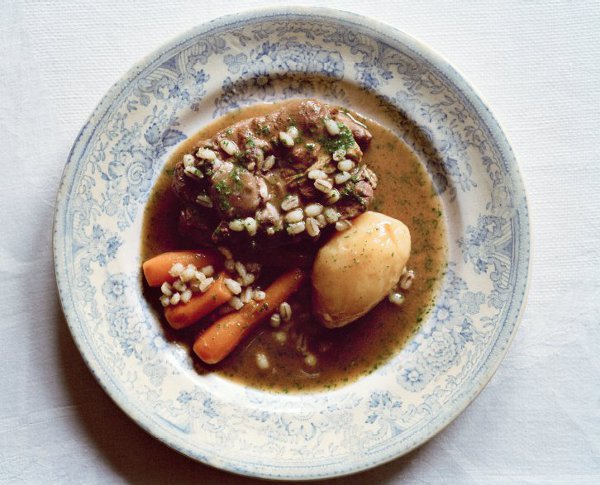Good Cook (10 page)
Authors: Simon Hopkinson

serves 4
for the hollandaise sauce
3 egg yolks
2 sticks unsalted butter, melted
a little salt and generous freshly ground white pepper
juice of ½ a lemon
2 tbsp snipped chives
4 pieces of smoked haddock, approx. 5–6 oz each, boned and skinned
9 oz milk
for the spinach
17 oz spinach leaves
2 tbsp butter
salt and freshly ground black pepper
A simple-sounding little dish, but I hope you won’t mind having a go at the hollandaise sauce, which is integral to the success of the assembly. The method for the sauce is a traditional one, but you may like to go down the small food processor route, which is a good deal easier. In this case, the texture emerges slightly different from the original (more emulsified), but as it is thinned down with the haddock-cooking milk later, this is not the end of the world, culinary-wise.
To do this quick method, simply place the egg yolks in a small food processor with a splash of water, switch on and process until airy and pale. Heat the butter until quite hot and bubbling (use a small pan with a lip, to aid pouring) and, with the motor running, slowly pour in the butter until the sauce has become thick, as with making mayonnaise. You may like to add a touch of the melted butter’s milky residue, as the processor method usually makes a much thicker sauce. Season as explained on
page 109
.

To make the hollandaise sauce, whisk together the egg yolks with a tiny splash of water in a stainless steel pan over a very low heat, until thick and smooth. Now, off the heat, continue to whisk while pouring in the melted butter in a thin stream, leaving behind the milky residue that has settled in the bottom of the butter pan. Season the sauce and sharpen with lemon juice, to taste. Keep warm.
To cook the smoked haddock, very gently poach the pieces in the milk on a low simmer for 2 minutes. Leave in the milk while you quickly prepare the spinach. Cook this in a large frying pan in the butter with a little seasoning, until wilted and glossy. Drain in a colander to remove excess liquid, then divide the spinach between 4 warmed plates. Fish out the 4 pieces of haddock from the milk, drain for a moment on paper towels, then place one on top of each plate of spinach.
For the sauce, loosen the hollandaise with a little of the poaching milk and whisk to a pouring consistency. Stir in the chives and spoon over the fish and spinach. Serve forthwith.
serves 4, as a first course
approx. 1½ lb very fresh, large sardines filleted, or use similar-sized herrings
2 oz sea salt
juice of 1 large lemon
1 medium onion, peeled and thinly sliced
a few black peppercorns, sprigs of fresh thyme, crumbled dried red chillies, a bay leaf or two
7–8 tbsp fruity olive oil
The instruction “Ask your fishmonger to fillet and bone the fish for you” fills me with fear and trepidation these days. I mean, just how many skilled fishmongers are there left? I recently saw a clutch of magazine recipes where the reader was instructed to ask his monger to de-beard his big bag of mussels … I imagine the muttered reply to this request would be, how shall we say, mostly unprintable, here.
Anyway, it
is
possible to do it yourself, with trial and error, but a truly dedicated fishmonger will be more than happy to, especially if you are a regular customer. Just give him some notice, is all I ask. The occasional supermarket fishmonger may also be able to help.
Put the fish fillets into a rectangular dish and strew with the salt. Cover, and put in the fridge for 24 hours, turning them once. Lift out the fillets, throw away the salty juices, rinse them and pat dry. Now, put the fillets into a plastic container that has a lid. Squeeze over the lemon juice, cover with the onions and scatter with the peppercorns, thyme, chillies, and bay. Spoon over the olive oil, put on the lid and place in a very cool place for 24 hours—preferably not in the fridge, unless the weather is more than clement. Remove to room temperature 1 hour before serving, decant on to a pretty serving dish, and eat with brown bread and butter. For a light lunch or supper dish, serve up with a bowl of hot, buttered new potatoes.


serves 2, for a light supper, or as a weekend breakfast treat
1 undyed kipper or smoked herring
a little soft butter
6 or 7 small to medium plum tomatoes
4–5 tbsp double or heavy cream
2 tsp English-made mustard (Colman’s, preferably)
a couple of pinches of curry powder
a touch of salt, if necessary
For the best flavor, here, use a whole, undyed kipper as instructed. However, if you are less than bold with bones, buy kipper fillets. The boiling water step remains the same for filleted fish, even though they may look just a little bit underdone in the middle, as the fish will continue to cook a little more, once in the oven. “A sweet dish with great charm,” a kind friend once said when I served it up to him.
Preheat the oven to 400°F.
Put the kipper into a shallow dish. Boil a kettle and submerge the kipper in the boiling water. Leave there for 5 minutes, and drain. Leave to cool for a few minutes, then flake off most of the meat that is not too riddled with whiskery bones. Pile the kipper meat into the center of two lightly buttered, ovenproof dishes and set aside. Plunge the plum tomatoes into boiling water, leave for a few seconds, then drain and peel off the skins. Cut in half lengthways and arrange around the kipper meat, rounded side uppermost. Using a small saucepan, warm the cream and whisk into it the mustard, curry powder and a pinch of salt, to taste. Pour this over the kipper and tomatoes and bake in the oven for 10–15 minutes, or until quietly bubbling and beginning to nicely gild all over. Some bread is essential here, I think.
serves 4
8 thick slices neck of lamb, approx. 1½ lb
salt and white pepper
2 large onions, halved and thinly sliced
7–8 smallish carrots, approx. 350g, peeled and quartered lengthways
14 oz smallish new potatoes, peeled
2 bay leaves
4–5 cloves
2 oz pearl barley
3–4 tbsp dripping or butter
1 heaped tbsp all-purpose flour
a few shakes of Worcestershire sauce (optional)
2–3 tbsp chopped parsley
A favorite childhood recipe, this one, and equally divided between both Mum and Dad, as the cooks who made it. We probably ate it at least once a month during the colder months, maybe more. That familiar, most savory and deep scent emanating from the bottom oven of the Aga when walking into the kitchen after a cold walk home from the school bus, was for this little boy, just the best smell in the whole world.
Occasionally—about twice a year, I reckon—Mum would mildly swear (“Blood and Sand!” was her favorite expletive), having forgotten to remove the freshly laundered washing from the drying rack, hauled up above said Aga, before she began to cook this marvelous braise. My brother and I thought this hilarious. Poor old Mum—and especially in the days before she had acquired a spin clothes dryer …
And, by the way, she always added plenty of ready-ground white pepper (there was no other, then) to her lamb neck. I still so do, for that authentic memory, but you don’t have to.
Note: if you wish to both be frugal and add extra flavor to the braise, then ladle off the surface fat (instead of using paper towels) from the settled lamb broth when it has finally emerged from the oven with the vegetables and meat together, and use some of the fat (instead of the dripping or butter) to make the roux with which to thicken the broth.

Preheat the oven to 325°F.
Season the neck of lamb well, particularly with pepper, and put into a shallow, lidded casserole (one that will transfer from stove-top to oven), so that the slices sit tightly, almost as one layer. Pour over approx. 1¼ pints of water, or to cover by about ½ inch. Slowly bring up to a simmer, and skim off any scum that forms on the surface; I find that a few sheets of paper towels laid over the surface does the trick. Cover the pot and slide into the oven. Cook for 1 hour.
Remove the casserole, lift out the lamb and put on to a large plate, for the time being. Add the vegetables to the pot, stir them around and, over a low heat, once more bring the (now) lamb broth and vegetables back to a simmer. Remove any scum, as before. Reintroduce the lamb pieces to the pot, tucking them in and around the vegetables. Add the bay leaves, cloves and also the pearl barley, sprinkling it in here and there. Cover and return to the oven for a further hour, turning the temperature down a little if the liquid within is bubbling too fast—have a peek, occasionally.
Remove the pot and check to see if the lamb is tender—it should feel very tender when poked with a skewer—and that the vegetables, too, are well cooked through. If not, return to the oven for a further 20 minutes, or so. Now, lift out all the meat and vegetables from the pot and lay out on a large plate once more. Allow the broth to settle, then, once again (the last time, I promise), lift off any surface fat with more sheets of paper towels.
Melt the dripping or butter (unless you are using the fat from the braise; see
page 117
) in a small pan and stir in the flour. Cook gently together, stirring well, for 5 minutes or so, until the mixture (a roux) is golden brown. Whisk in a ladle or two of the broth to this, until smooth, then return it to the majority of broth in the pot, further whisking everything together until it is a smooth gravy. Add Worcestershire sauce, if using, to taste. Bring this to a simmer, carefully return the meat and vegetables to the pot, and reheat for at least 15 minutes. Check the seasoning before finally stirring in the parsley. Serve this complete meal piping hot.

